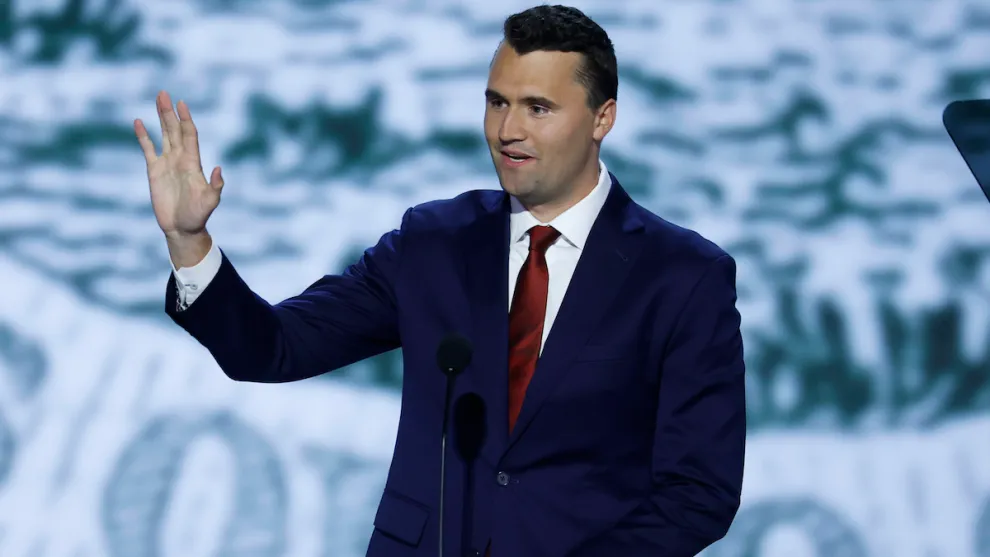In contemporary American politics, few figures have loomed over youth conservatism as Charlie Kirk has. A charismatic speaker, prolific social media presence, founder of Turning Point USA (TPUSA), and one who has made culture wars his backbone—Kirk’s journey from high school activist to national personality is full of ambition, polarization, and influence. In this profile, we trace his life, views, achievements, controversies, and the mark he left upon his untimely death in 2025.
Table of Contents
Early Life & Background
Birth & upbringing: Charles James Kirk was born on October 14, 1993, in Arlington Heights, Illinois. He grew up in a suburban environment.
Education: Attended college but dropped out to focus on activism. His early interests centered around politics and conservative ideas.
Faith: An evangelical Christian, Kirk’s religion was deeply embedded in his identity and later in his political framing. His faith shaped many of his views on social issues.
Founding Turning Point USA
Establishment: In 2012, at only 18-19 years old, Kirk co-founded Turning Point USA (TPUSA). The nonprofit aimed to promote conservative values—free markets, limited government, and individual liberty—on university and high school campuses across the U.S.
Growth: TPUSA expanded rapidly, setting up chapters in thousands of schools nationwide and becoming one of the most active conservative youth organizations.
Turning Point Action: Alongside TPUSA, Kirk led Turning Point Action, a related entity focused more directly on political campaign and voter mobilization efforts.
Media Career and Rise to Prominence
The Charlie Kirk Show: Radio and podcast platform launched in 2020, affiliated with Salem Media’s “The Answer” channel. It gained a major following among conservative audiences.
Books & Authorship: Authored several bestsellers: The MAGA Doctrine, The College Scam: How America’s Universities Are Bankrupting and Brainwashing Away The Future of America’s Youth, Campus Battlefield, among others.
Speaking & Media Appearances: Kirk regularly appeared on Fox News, CNBC, various talk shows. He was the youngest speaker at the 2016 Republican National Convention and opened the RNC in 2020.
Personal Life & Beliefs
Family: In 2021, Kirk married Erika Frantzve, a fashion designer, businesswoman, and former Miss Arizona USA. They had two children: a daughter born August 2022 and a son in May 2024.
Religious Beliefs: Deeply committed evangelical Christianity. Faith informed his worldview on morality, society, education, and politics.
Political alignment: Strongly aligned with Trumpism; embraced the MAGA movement and conservative ideology with emphasis on culture, family, faith, and limited government.
Key Messages & Core Political Views
Critical Race Theory (CRT) & Campus Policies: Vocal opponent of CRT, DEI programs, and liberal policies in academia. Advocates for conservative curricula, Christian values in public life.
Education Reform: Critique of university education, which he argues is elitist, overly leftist, and economically burdensome. Books and speeches often focus on perceived indoctrination in higher education.
Culture Wars & Identity: Emphasis on traditional gender roles, opposition to trans-affirming care, criticism of LGBTQ+ activism. Positions on religious morality leveraged heavily.
Political Mobilization & Youth Vote: Kirk was famed for mobilizing college students and young conservative voters, especially during Trump campaigns. He used media, campus chapters, and social media to reach wide audiences.
Controversies and Criticism
Misinformation and Polarizing Rhetoric: Criticized for statements on elections, vaccines, immigration, mask mandates; accused of spreading misinformation.
Financial Scrutiny: TPUSA’s financial transparency questioned. Reported large increases in Kirk’s salary, debate over nonprofit status claims.
Campus Activism Conflict: Often clashed with students and faculty over free speech, protected classes, and cultural issues on college campuses. Critics argue his rhetoric encourages division.
Influence on Youth and College Politics
Campus presence: TPUSA chapters in thousands of high schools and colleges. Student activism and events pushed conservative ideas among youth.
Social Media Reach: Massive online following through podcast, YouTube, Twitter/X, Instagram. Uses digital content to reach young demographics.
Touring & Public Events: His “You’re Being Brainwashed” tour and public speaking engagements helped build his base among Gen Z and millennials.
Financials & Net Worth
Estimates placed his net worth in the range of $12–14 million by 2025. Income sources included salary from TPUSA, book royalties, speaking fees, media income, and real estate.
Political nonprofits and donations from conservative donors contributed significantly to TPUSA’s budget.
Recent Events: Utah Shooting & Final Days
Shooting at Utah Valley University: On September 10, 2025, while speaking during the “American Comeback” Tour at Utah Valley University, Kirk was shot, reportedly in the neck. This tragic event led to his death.
Public Reaction: Widespread reactions from conservative and liberal figures alike; the event raised questions about political violence and threats faced by public figures.
Legacy & Public Reaction
Polarizing figure: Celebrated by many on the right for his activism, faith-based values, and youth outreach; condemned by critics who argued his rhetoric stoked division.
Influence: Left a network of TPUSA chapters, media platforms, books, and a large follower base.
Cultural impact: His books and speeches will likely continue to be referenced in discourse on youth politics, conservative ideology, free speech, and education critique.
Conclusion
Charlie Kirk’s life was marked by rapid ascent, passionate advocacy, fervent controversy, and a profound influence on youth conservatism in America. He mobilized, educated, and raised voices among young people around issues of education, identity, and governance. While praise and criticism followed him in nearly equal measure, his presence undeniably shifted the landscape of American political engagement.
As the nation reflects on his death, the questions his life raised—about the role of youth in politics, the ethics of media influence, and the power of ideology—continue. Charlie Kirk was more than a figurehead; he was a lightning rod. His legacy, contested and loud, offers lessons about influence, responsibility, and the polarizing power of politics today.
FAQs About Charlie Kirk
Q1: Who was Charlie Kirk?
Charlie Kirk was an American conservative activist, media personality, and the co-founder of Turning Point USA. He also hosted The Charlie Kirk Show.
Q2: What is Turning Point USA?
A nonprofit organization focused on promoting conservative values among youth in high schools and colleges across the U.S.
Q3: When and where was he born?
He was born on October 14, 1993, in Arlington Heights, Illinois.
Q4: What are his main political views?
He advocated for limited government, free markets, conservative social values, faith-based ethics, opposed what he viewed as liberal indoctrination in education, and criticized DEI and CRT.
Q5: What books did he write?
Notable works include The MAGA Doctrine, The College Scam, Campus Battlefield, among others.
Q6: What was his net worth?
Estimated around $12–14 million by 2025 with multiple income streams.
Q7: What controversies surrounded him?
Criticisms included alleged misinformation, financial transparency issues, polarizing speeches, opposition to inclusion and LGBTQ rights, and divisive campus activism.
Q8: How did he die?
He was fatally shot on September 10, 2025, while speaking at Utah Valley University during an event.
Q9: Was he married?
Yes, he married Erika Frantzve in 2021; they had two children.
Q10: What was his religious affiliation?
He was an evangelical Christian, and his beliefs influenced much of his worldview and activism.
Q11: What did people think about him?
Divided. Supporters saw him as a courageous voice for conservative youth; critics saw him as a propagator of division and misinformation.
Q12: What impact did he have on youth politics?
Significant—through TPUSA’s campus presence, his books, speaking tours, and media outreach, he shaped many young conservatives’ thoughts and political engagement.
Q13: What was his role in recent elections?
Kirk and TPUSA played a major role in mobilizing young conservative voters, supporting Trump & GOP campaigns.
That he stoked culture war divides, supported discriminatory policies, held conspiratorial views, or misused nonprofit structures.
Q15: How will he be remembered?
Likely as a pivotal and controversial figure—one who built enormous influence among young conservatives, shaped cultural debates, and whose death underscores the volatile intersection of politics and activism in America.












